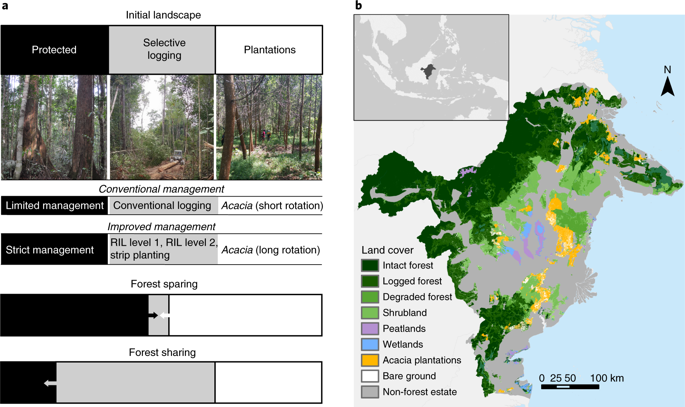Nature Sustainability ( IF 25.7 ) Pub Date : 2019-01-10 , DOI: 10.1038/s41893-018-0203-0 Rebecca K. Runting , Ruslandi , Bronson W. Griscom , Matthew J. Struebig , Musnanda Satar , Erik Meijaard , Zuzana Burivalova , Susan M. Cheyne , Nicolas J. Deere , Edward T. Game , F. E. Putz , Jessie A. Wells , Andreas Wilting , Marc Ancrenaz , Peter Ellis , Faisal A. A. Khan , Sara M. Leavitt , Andrew J. Marshall , Hugh P. Possingham , James E. M. Watson , Oscar Venter

|
Tropical forests are globally important for both biodiversity conservation and the production of economically valuable wood products. To deliver both simultaneously, two contrasting approaches have been suggested: one partitions forests (sparing); the other integrates both objectives in the same location (sharing). To date, the ‘sparing or sharing’ debate has focused on agricultural landscapes, with scant attention paid to forest management. We explore the delivery of biodiversity and wood products in a continuum of sparing-to-sharing scenarios, using spatial optimization with set economic returns in East Kalimantan, Indonesia—a biodiversity hotspot. We found that neither sparing nor sharing extremes are optimal, although the greatest conservation value was attained towards the sparing end of the continuum. Critically, improved management strategies, such as reduced-impact logging, provided larger conservation gains than altering the balance between sparing and sharing, particularly for endangered species. Ultimately, debating sparing versus sharing has limited value while larger gains remain from improving forest management.
中文翻译:

通过更好地管理热带森林的共享而获得更大的收益
热带森林对于保护生物多样性和生产具有经济价值的木制品都具有全球重要性。为了同时提供这两种方法,已经提出了两种对比方法:一种是对森林进行分区(稀疏);另一种是对森林进行分区。另一个将两个目标整合在同一位置(共享)。迄今为止,“保留或共享”辩论主要针对农业景观,而对森林管理的关注却很少。我们在保留生物多样性的前提下,探索了生物多样性和木材产品的交付方式,并利用空间优化技术并在印度尼西亚东加里曼丹省设定了经济回报,这是生物多样性的热点。我们发现,尽管在连续体的稀缺末期获得了最大的保护价值,但保留或共享极端都不是最优的。至关重要的是 改进的管理策略,例如减少影响的伐木,比改变稀疏和共享之间的平衡(尤其是对濒危物种而言)提供了更大的保护收益。最终,辩论节约与共享具有有限的价值,而改善森林管理仍可带来更大的收益。































 京公网安备 11010802027423号
京公网安备 11010802027423号